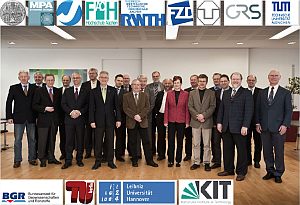On March 30, 2010, the Alliance of Competence in Nuclear Engineering celebrated its 10th anniversary within the framework of a meeting at Karlsruhe Institute of Technology. The Alliance was founded in 2000 in order to improve Germany-wide coordination of research and development activities in the field of nuclear engineering and to specifically promote young scientists. By its work, the Alliance of Competence supports the state in fulfilling its provident research obligation for the safe operation of nuclear facilities and the safety of nuclear waste disposal.
“In the past ten years, work of the Alliance of Competence in Nuclear Engineering was highly successful,” underlines Dr. Peter Fritz, spokesman of the Alliance of Competence. “To give an example of the work of our Alliance, we first evaluated the need for young scientists in order to maintain the necessary competence. Comparison with the then existing teaching offers in the field of nuclear engineering at German universities revealed a striking deficit in education. The Alliance of Competence contributed considerably to reversing the situation. In the past years, education offers in Germany were improved considerably with the support of politics and utilities. The direct consequence is a steady growth of the number of students.”
The Alliance of Competence was founded in the first election period of the red-green government under Federal Chancellor Schröder, whose coalition agreement had defined the political will to considerably reduce public funding of reactor safety and final disposal research. On January 21, 2000, an evaluation committee of the Federal Ministry of Economics formulated: “Irrespective of the requirements associated with the political decision to phase out of the use of nuclear energy in Germany, competence in nuclear safety will have to be maintained in the next decades. Only then can the provident research obligation of the state be fulfilled and the safety of nuclear facilities and disposal paths be ensured according to the international state of the art.” Since then, the Alliance of Competence in Nuclear Engineering that was founded shortly afterwards has been concentrating in particular on the education of diploma and Ph. D. students. Colloquia, such as “Perspectives in Nuclear Engineering”, where future academics are informed by representatives of the nuclear sector about attractive and safe nuclear jobs, have meanwhile attracted such a large audience that interested persons have to be referred to following courses.
Development of the number of professorships in the field of nuclear engineering, which in 2002 was prognosticated to amount to five in 2010, was reversed by the work and initiatives of the Alliance of Competence in Nuclear Engineering. In the past three years alone, 15 new positions of professors in the field of nuclear engineering were filled in Germany. Applications for other positions are presently being invited. Regular exchange of experts from research, politics, and industry in the Alliance of Competence in Nuclear Engineering has resulted in an increased support of teaching activities at German universities by industry. An example is the AREVA Nuclear Professional School of KIT founded in 2009. All measures have been taken to meet the meanwhile significantly increased demand for staff of industry and inspection organizations.
Intensified cooperation with universities gave rise to four “sub-alliances” on the regional level: The Competence Center East (2004), the Association for Research and Lecturing in Nuclear Engineering in Southwest Germany (2007), the Alliance of Competence in Radiation Research (2007), and the Nuclear Engineering Forum West (2009).
The Alliance of Competence has also improved the coordination of research activities, for instance by a regular exchange of information on current research results and trends in nuclear engineering. This is confirmed by the international reputation of German nuclear safety research. The research activities of the Helmholtz Association, for example, are regularly evaluated to be of internationally leading character.
At yesterday’s anniversary meeting of the Alliance of Competence, the agenda included a review of the past. Many persons had been invited, who decisively contributed to the successful work. In addition, strategic future objectives of the Alliance were discussed, the aim being to contribute to responsible nuclear engineering on behalf of the society.
Karlsruhe Institute of Technology (KIT) is one of Europe’s leading energy research establishments. The KIT Energy Center pools fundamental research with applied research into all relevant energy sources for industry, households, services, and mobility. Holistic assessment of the energy cycle also covers conversion processes and energy efficiency. The KIT Energy Center links competences in engineering and science with know-how in economics, the humanities, and social science as well as law. The activities of the KIT Energy Center are organized in seven topics: Energy conversion, renewable energies, energy storage and distribution, efficient energy use, fusion technology, nuclear power and safety, and energy systems analysis.
Being “The Research University in the Helmholtz Association”, KIT creates and imparts knowledge for the society and the environment. It is the objective to make significant contributions to the global challenges in the fields of energy, mobility, and information. For this, about 10,000 employees cooperate in a broad range of disciplines in natural sciences, engineering sciences, economics, and the humanities and social sciences. KIT prepares its 22,800 students for responsible tasks in society, industry, and science by offering research-based study programs. Innovation efforts at KIT build a bridge between important scientific findings and their application for the benefit of society, economic prosperity, and the preservation of our natural basis of life. KIT is one of the German universities of excellence.

